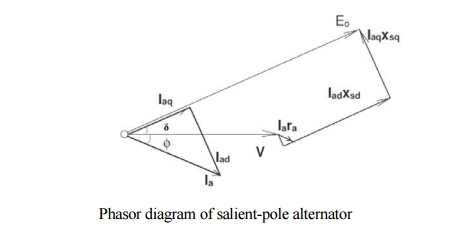Chapter: Electrical machines : Synchronous Generator
Direct-axis and Quadrature-axis Synchronous Reactances
Direct-axis and Quadrature-axis
Synchronous Reactances
Blondel's
two-reaction theory considers the effects of the quadrature and direct-axis
components of the armature reaction separately. Neglecting saturation, their
different effects are considered by assigning to each an appropriate value of
armature-reaction "reactance," respectively xad and xaq . The effects
of armature resistance and true leakage reactance (XL) may be treated separately, or may be added to the armature
reaction coefficients on the assumption that they are the same, for either the
direct-axis or quadrature-axis components of the armature current (which is
almost true). Thus the combined reactance values can be expressed as,
Xsd = xad + x, and Xsq = xaq + x, for the direct- and cross-reaction axes respectively.
In a
salient-pole machine, xaq, the quadrature-axis reactance is smaller than xad,
the direct-axis reactance, since the flux produced by a given current component
in that axis is smaller as the reluctance of the magnetic path consists mostly
of the interpolar spaces. It is essential to clearly note the difference
between the quadrature and direct-axis components Iaq, and Iad of the armature
current Ia, and the reactive and active components Iaa and Iar. Although both
pairs are represented by phasors in phase quadrature, the former are related to
the induced emf Et while the latter are referred to the terminal voltage V.
These phasors are clearly indicated with reference to the phasor diagram of a
(salient pole) synchronous generator supplying a lagging power factor (pf) load,
shown in Fig


Related Topics